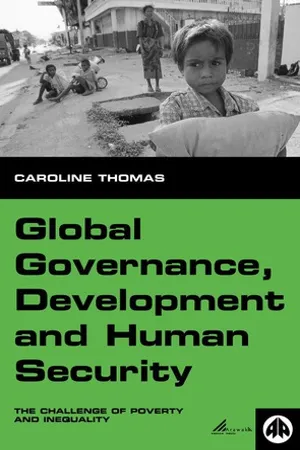
Global Governance, Development and Human Security
The Challenge of Poverty and Inequality
- 168 pages
- English
- PDF
- Available on iOS & Android
Global Governance, Development and Human Security
The Challenge of Poverty and Inequality
About this book
This book argues that the global development and security agendas are merging. No longer is the language of security confined within the straitjacket of the state and associated national security concerns. The spotlight is shifting to the legitimate security concerns of human beings. The book examines how development is promoted by global governance institutions and how this has impacted on human security in the 1990s. Caroline Thomas focuses on the effects of trade, finance, and investment liberalisation on deepening inequality. She explores different approaches for addressing the deepening inequality which threatens the economy at all levels, from the household, to the community, to the global. The book investigates reformist and transformist visions of the future and the contrasting policies tabled for their achievements. Thomas argues that ultimately human security requires a different developmental strategy.
Frequently asked questions
- Essential is ideal for learners and professionals who enjoy exploring a wide range of subjects. Access the Essential Library with 800,000+ trusted titles and best-sellers across business, personal growth, and the humanities. Includes unlimited reading time and Standard Read Aloud voice.
- Complete: Perfect for advanced learners and researchers needing full, unrestricted access. Unlock 1.4M+ books across hundreds of subjects, including academic and specialized titles. The Complete Plan also includes advanced features like Premium Read Aloud and Research Assistant.
Please note we cannot support devices running on iOS 13 and Android 7 or earlier. Learn more about using the app.
Information
Table of contents
- Contents
- Acknowledgements
- Dedication
- Preface: Human Security in a Global Economy
- List of Boxes and Tables
- List of Acronyms and Abbreviations
- PART ONE: The Human Security Challenge
- 1. Setting the Scene
- 2. Mapping Inequality
- 3. Ideas About Development
- PART TWO: Global Development Practice in the 1980s and 1990s
- 4. The Reform of National Economies
- 5. Liberalisation of Trade, Finance and Investment
- PART THREE: Development Pathways for Human Security in the Twenty-first Century
- 6. The Reformist Pathway for the Twenty first Century
- 7. Towards an Alternative Pathway for the Twenty-first Century
- References and Bibliography
- Index